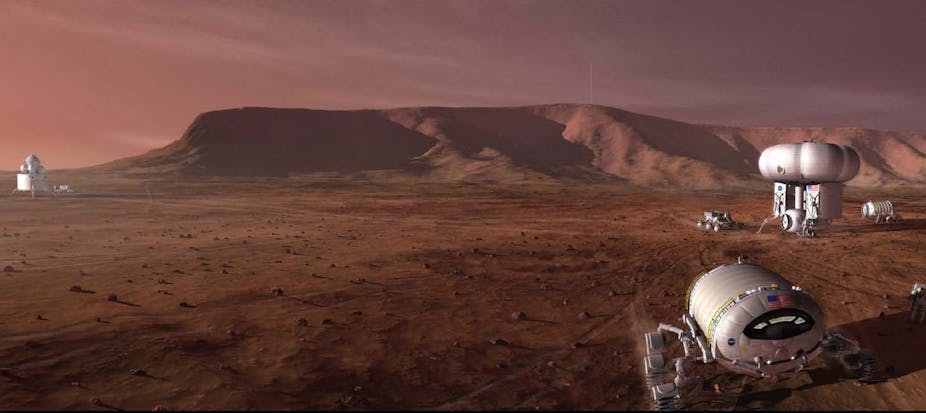It is inevitable that we will one day venture into space beyond the moon not just with robots but in person.
Exploration is part of the human psyche: we are risk-takers with an insatiable curiosity. No pragmatic arguments about cost, usefulness or danger will stop us, and nor should they. For better or worse we have come to dominate Earth because of this drive, and this is not about to stop.
Now the target is Mars. In 1962 John F. Kennedy declared:
“We choose to go to the moon. We choose to go to the moon in this decade and do the other things, not because they are easy, but because they are hard, because that goal will serve to organise and measure the best of our energies and skills, because that challenge is one that we are willing to accept, one we are unwilling to postpone, and one which we intend to win, and the others, too.”
On July 20 1969, Apollo 11 landed on the moon, and those of us lucky enough to be alive then will never forget it.
Of course it was the Cold War and the launch of the first satellite, Sputnik, in 1957 that sparked the race to the moon.
Thankfully those times have passed but the spirit of exploration endures. Many cynics insist that the inspiration manifest in space exploration is romantic nonsense, but they miss the point.
Without great goals we might as well be kangaroos, following the grass and complaining about the weather.
In a speech in April 2010, President Obama tried to emulate JFK. In killing off George W. Bush’s vision for NASA of returning to the Moon, he substituted Mars and indeed the rest of the solar system.
In his speech, Obama did not reach the rhetorical heights achieved by Kennedy (who could?), but he outlined bold goals - including a plan to land humans on an asteroid by 2025. His grand vision involves sending astronauts to Mars by the 2030s.
While I think bold goals are laudable and necessary, and while I have an enduring interest in the possibility that Mars might harbour life, I think returning to the moon was, and is, a good idea.
My reasons are both scientific and pragmatic.
The moon records significant portions of the history of the solar system. After forming as a result of a Mars-sized object colliding with Earth about 4.55 billion years ago, it has been a stable lump of rock.
It is free of the plate tectonics and weathering that constantly resurface Earth and erase much of our history. Consequently its landscape dates back to the time of its formation, with the only major changes resulting from asteroid, meteor and dust impacts.
Its history of impacts is what provides us with a clock to date events on the surfaces of the other rocky planets and moons.
This clock is imprecise because we have dated few rocks from the moon. Further precise dates from known sites would improve the clock and thus our understanding of the solar system.
Also, if we are to go to Mars - a six-to-nine-month journey, one way - we need to practise first. A three-day journey to the moon would be ideal in this regard.
There are more fanciful suggestions, such as mining helium on the moon, and also wishful thinking, such as placing telescopes there to overcome the problems of looking through Earth’s atmosphere and coping with our radio emissions. That’s not to say all this will not happen at some point.
The reason for focusing on Mars is that it is our best chance of discovering whether we are alone in the universe.
Early in its history Mars was warm and wet, as attested to by the widespread presence of dry river channels, lake beds, hydrous minerals and those deposited from water, and possibly even a former ocean in the northern hemisphere. That was mostly more than three billion years ago.
In this same period life thrived on Earth - much of the evidence for which comes from the Pilbara region of Western Australia. We can be confident that Mars was habitable then, and may still be today in some protected niches.
Ponder this: everything we know about life is based on a sample of one, life on Earth. Imagine the profound revelations that would emerge if we increased that sample to two.
Of course, whether or not we need to send astronauts to Mars is a separate issue. Robotic explorers of Mars and elsewhere have been spectacularly successful.
Most of what we know about Mars has been learnt this way. But from my perspective, as a field geologist, no robot yet developed can come close to my powers of observation, analysis and decision-making.
But sending astronauts to Mars by the 2030s is probably fanciful. It would be horrendously expensive (current estimates mention figures such as US$50 billion) and it would be very dangerous - near zero gravity and high radiation in transit being just two of the hazards.
I would love to live to see astronauts on Mars in my lifetime but it is not going to happen (I’m 66). Unless there is a new space race, I doubt the relatively youthful President Obama will see it either. But eventually it will happen, no matter what the US decides. It is our destiny.
Mark 2050 in your calendars.

